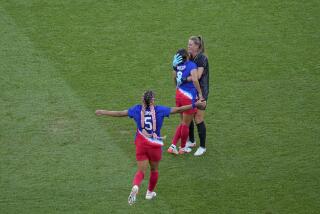Funny, but It Turns Out There Is Crying in Hockey
- Share via
NAGANO, Japan — A couple of them hyperventilated, several felt their knees buckle, all of them cried and experienced chills. But it was more than a single moment crashing down on the U.S. women’s hockey team, it was an accumulation. You don’t gush this much emotion over one moment. Most of them, probably all, were pegged as tomboys. Several used initials or even boys’ names to sneak their way into boys hockey leagues when they were young. A.J. Mleczko recalls people joking that she was her father’s favorite son, and the mothers in her neighborhood wondering when Allison would grow out of this ridiculous phase.
It was more than the moment for the U.S. women’s hockey team, wondrous, and historic and tingly as that gold medal moment was. It was everything: the rides to the rink to practice, the wondering if they should switch from hockey skates to figure skates, the doubts that being a girl playing ice hockey would ever amount to anything more than morning skates and nights filled with fantasies. It was hoping Title IX would give them a chance their mothers and aunts never had, it was dropping out of school to try out for the national team. It was losing to Canada six times in meaningful tournaments--four straight in the world championships and having to listen to “O Canada” instead of the “Star Spangled Banner,” while the Canadian girls clutched their flowers and medals. It’s knowing that the real payoff would be the journey itself because there’s no such thing yet as a tangible reward.
I’ve watched a lot of people win championships and medals before; I’ve never seen so many hard-boiled eggs have to reach for a tissue until this. Corny as it sounds, I guess this is why you come to the Olympics, hoping to stumble upon something that makes you feel better than you thought you could feel, to connect with somebody or some team. The more unexpected, the more unbridled the joy.
The U.S. women themselves don’t know exactly how it happened. One day they’re making their Olympic debut, the next they’re receiving faxes and and cards and letters from everywhere. “I think women’s hockey has grown up in the dark,” Mleczko said. “I don’t think we’re ready for any of this. People say they love watching us play, and all we can ask is, ‘How is that possible? Where’d you see us?’ We’ve met people on the U.S. bobsled team and they told us they wanted to come see us play but they couldn’t get tickets. We see all these people, and we say, ‘What are they doing here?’ I don’t understand it, but it’s wonderful.”
If you didn’t already know the difference between a career and a crusade, this hockey team showed you. Some of them, like goalie Sarah Tueting from suburban Chicago, don’t know if they’ll ever play a competitive hockey game again. That’s why they could throw themselves into this so completely.
“I had chills,” Mleczko said, “and I’m not talking about just one. My whole body was overcome. I kept seeing the painted faces and the huge American flags. . . . I’ve never felt so patriotic in my whole life. None of us can carry a tune to save our lives but we were singing our lungs out [for the national anthem]. And then the emotion just overwhelmed us, it just took us over.”
It wasn’t simply about America, which is something Canada Coach Shannon Miller somehow realized in her sadness. Someday, when a U.S. men’s basketball team loses an Olympic game, the coach is going to feel the way a Canadian coach feels after losing a hockey game. Still the bigger picture grabbed even Miller. “When they showed Cammi Granato’s face on the big screen and the medal around her neck, my feelings changed completely. I realized a gold medal was being hung around the neck of a female hockey player, and I couldn’t believe the effect it had on me.”
It couldn’t have been much better, really. Oh, it would have been nice if the U.S. men’s team had the sensitivity not to schedule a stupid, meaningless team dinner right during the women’s gold medal game. It would have been nice if they’d have been allowed to show up in force as the Canadian players--Wayne Gretzky and every single one of his teammates--did in support of their countrywomen. You should have seen the Canadian men’s players leap out of their seats and break into thunderous applause when Canada made it 2-1 late in the third period and threatened to take the game into overtime.
But you know, it’s probably fitting that it turned out that the American men were missing, because most of these women have accomplished what they have without the support of men, particularly when they were young and awkward and figuring their dreams would never amount to gold around their necks.
It will be hard for anyone to disappoint them now, by virtue of what they’ve worked for and accomplished. Sandra Whyte, the woman who scored the empty-net goal to make it 3-1 and kick off the celebration, was talking about the connection between American women winning gold medals in gymnastics, softball and basketball in the 1996 Summer Games and the U.S. women winning hockey gold here in Japan. “I think there’s a connection,” she said. “Women are getting more and more opportunities that didn’t exist 10 years ago. And our society is changing to allow that growth.”
It’s a shame that had women’s hockey been promoted without so much resistance we might have been at this kind of emotional moment long, long ago.
More to Read
Go beyond the scoreboard
Get the latest on L.A.'s teams in the daily Sports Report newsletter.
You may occasionally receive promotional content from the Los Angeles Times.






